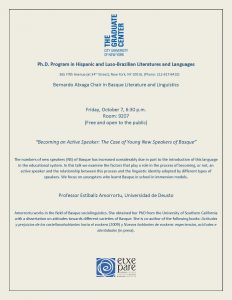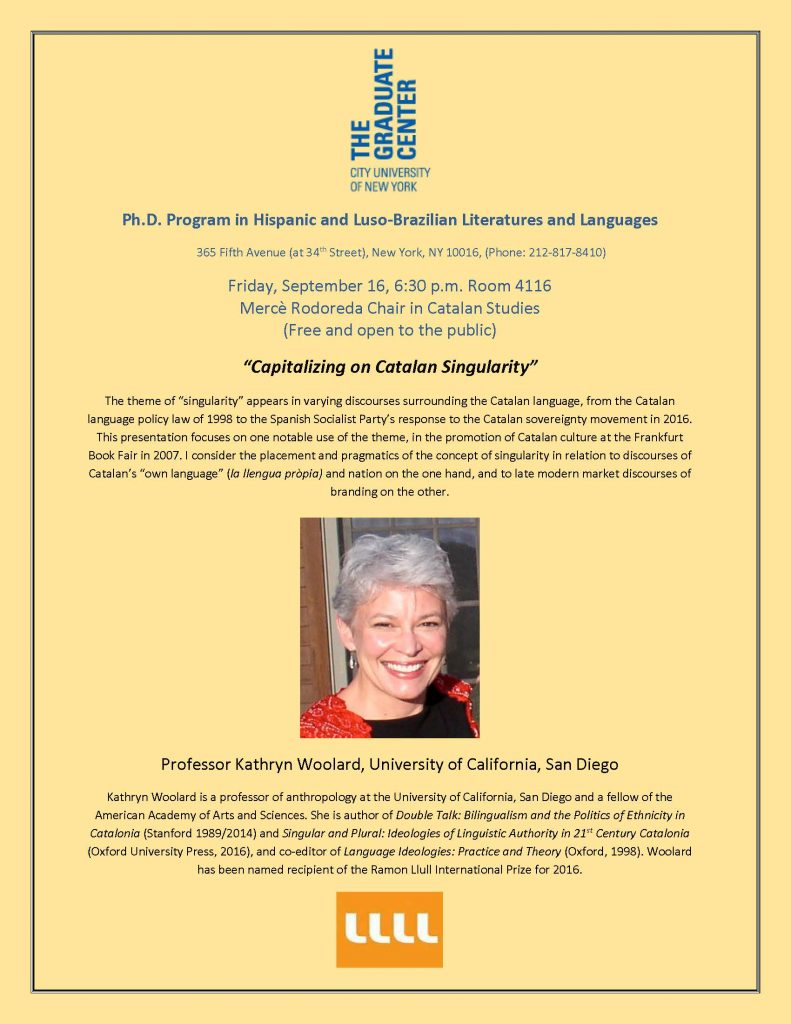Author Archives: Syelle
Tanya Karoli Christensen: “Vagueness in youth speech. Functional analyses of spoken Danish.”
International Linguistic Association
Monthly Lecture Series
Tanya Karoli Christensen
University of Copenhagen
Vagueness in youth speech. Functional analyses of spoken Danish.
Saturday, November 12, 2016 at 11 AM – 12 PM
Borough of Manhattan Community College, Room N451
199 Chambers Street, New York, NY 10007
NOTE: All attendees will be asked to show some form of ID in order to enter the college.
Contact: Maureen Matarese, mmatarese@bmcc.cuny.edu www.ilaword.org
Young people have always been charged with ruining the language of their parents and grandparents by being sloppy and imprecise in their speech (and writing, for that matter). However, it has long been argued that ’vague’ language may serve a range of interactional functions (e.g. Kempson 1977; Dines 1980; Channell 1994; Gassner 2012). For instance, vagueness may arise because of unclear reference between a linguistic item and a class of objects, because a speaker (or her language) lacks an appropriate word for a specific concept, or because precision is uncalled for in the context.
Many different types of linguistic items have been categorized as vague in one way or another, including approximate quantifiers (about N), generic expressions (thing), general extenders (and stuff like that) and epistemic phrases (I think). Since the interpretation of vague expressions rests on context, many studies revolve around the semantics-pragmatics interface, but because vague expressions come in such great variety, sociolinguists have also studied such expressions as examples of so-called discourse variation (e.g. Cheshire 2007; Tagliamonte & Denis; Pichler 2010).
In this talk, I review data and results from a series of research projects related to different types of vague expressions in modern spoken Danish, i.e. epistemic adverbials (måske ‘maybe’) and epistemic phrases, general extenders, as well as the highly productive equivalent of English –ish (Dan: –agtig). The material I draw upon is the large and richly annotated LANCHART database of sociolinguistic interviews compiled during the 1980s and early 2000s.
On the backdrop of distributional data, I exemplify and discuss some representative uses of vague expressions in youth speech. One particularly interesting context is the elicitation of language attitudes. The task of categorizing other people on the basis of their speech is obviously a face-threatening act (Brown & Levinson 1987), and informants orient to this by couching their descriptions in vague terms (1-2).
(1) altså måske er de lidt mere landlige ovre i Jylland men jeg ved det ikke rigtigt
I-mean maybe they are a-bit more rural over in Jutland but I don’t really know
(2) det er sådan lidt mere … slang … og bare … go with the flow-agtigt … end det der andet
it is like a-bit more … slang … and just … go with the flow-ish … than the other one
New York Times: Those Lips! Those Eyes! That Stubble! The Transformative Power of Men in Makeup
A handful of “beauty boys” have primped and preened their way into the female-centric world of Instagram and YouTube makeup artistry—and the cosmetics industry wants in.
Creole Conference at Brooklyn College, Oct. 28-29
“Haitain Creole: Orality and Cultural Identity”
Friday, October 28th 5:00 p.m.-9:00 p.m., and Saturday, October 29th, 9:00 a.m.-6:00 p.m.
at Brooklyn College, 2705 Campus Road
See below for events, and how to register!


Estíbaliz Amorrortu on Friday, 10/7/16: “Becoming an Active Speaker: The Case of Young New Speakers of Basque”
WHEN: Friday, October 7, 6:30 p.m.
WHERE: GC Room 9207
COST: Free and open to the public
ABOUT: “Becoming an Active Speaker: The Case of Young New Speakers of Basque”
The numbers of new speakers (NS) of Basque has increased considerably due in part to the introduction of this language in the educational system. In this talk we examine the factors that play a role in the process of becoming, or not, an active speaker and the relationship between this process and the linguistic identity adopted by different types of speakers. We focus on youngsters who learnt Basque in school in immersion models.
SPEAKER: Professor Estíbaliz Amorrortu, Universidad de Deusto
Amorrortu works in the field of Basque sociolinguistics. She obtained her PhD from the University of Southern California with a dissertation on attitudes towards different varieties of Basque. She is co-author of the following books: Actitudes y prejuicios de los castellanohablantes hacia el euskera (2009) and Nuevos hablantes de euskera: experiencias, actitudes e identidades (in press).

“Multilingualism and Language Empowerment: A Response to Inequality”: Free Conference at the GC on Friday, Sept. 23
Multilingualism and Language Empowerment: A Response to Inequality
A Graduate Center Symposium
WHEN:
Friday, September 23, 2016
WHERE:
Segal Theatre at The Graduate School and University Center of the City University of New York (CUNY Graduate Center): 365 Fifth Avenue, New York, NY, 10016.
DESCRIPTION:
Language and language choices play a significant yet often unacknowledged role in fostering inequality. This is most evident in the spheres of education, the workplace and public health, where insufficient services in “minority” languages result in disparities and lack of opportunities for speakers of those languages.
This symposium highlights the value and relevance of language and literacy projects conducted at the Graduate Center to New York’s multilingual population. Presentations throughout the day will focus on the education of immigrant students and speakers of minority languages, and will present the value and relevance of multilingualism and multilingual approaches as an effective way to combat inequality of access.
We hope you’ll join us to hear the latest research on the relationship between the maintenance or acquisition of languages and increasing equality of opportunity for speakers of minority and underrepresented languages.
“Capitalizing on Catalan Singularity”: Kathryn Woolard (U.C. San Diego), Friday, Sept. 16, 6:30 P.M.
The Graduate Center Ph.D. Program in Hispanic and Luso-Brazilian Literatures and Languages
DETAILS
WHERE: 365 Fifth Avenue, New York, NY 10016, Room: 4116 (Phone: 212-817-8410)
WHEN: Friday, September 16, , 201, 6:30 p.m.
ADMISSION: Free and open to the public
DESCRIPTION
“Capitalizing on Catalan Singularity”:
The theme of “singularity” appears in varying discourses surrounding the Catalan language, from the Catalan language policy law of 1998 to the Spanish Socialist Party’s response to the Catalan sovereignty movement in 2016. This presentation focuses on one notable use of the theme, in the promotion of Catalan culture at the Frankfurt Book Fair in 2007. I consider the placement and pragmatics of the concept of singularity in relation to discourses of Catalan’s “own language” (la llengua pròpia) and nation on the one hand, and to late modern market discourses of branding on the other.
Professor Kathryn Woolard, University of California, San Diego:
Kathryn Woolard is a professor of anthropology at the University of California, San Diego and a fellow of the American Academy of Arts and Sciences. She is author of Double Talk: Bilingualism and the Politics of Ethnicity in Catalonia (Stanford 1989/2014) and Singular and Plural: Ideologies of Linguistic Authority in 21st Century Catalonia (Oxford University Press, June 2016), and co-editor of Language Ideologies: Practice and Theory (Oxford, 1998). Woolard has been named recipient of the Ramon Llull International Prize for 2016.



